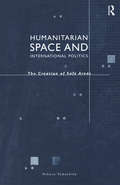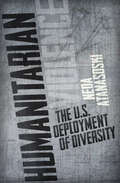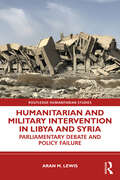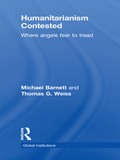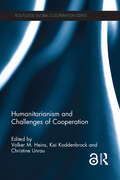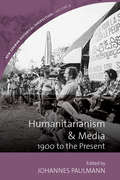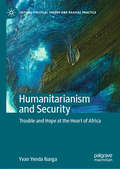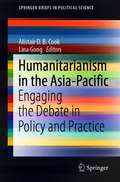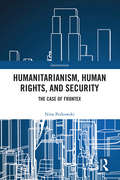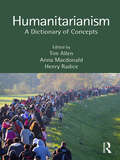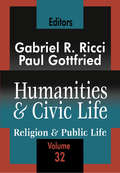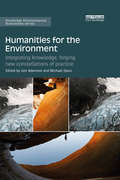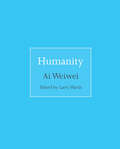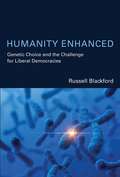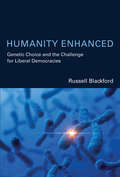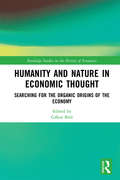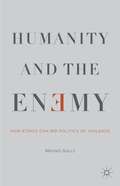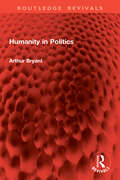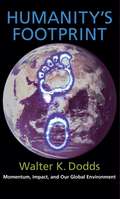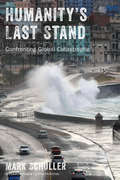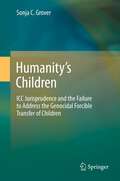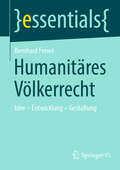- Table View
- List View
Humanitarian Space and International Politics: The Creation of Safe Areas
by Hikaru YamashitaThe creation of safe areas poses a number of difficult challenges to the spatial and normative organization of contemporary international politics. As a result, academics, practitioners and NGOs alike will find the case studies in this informative book essential reading. Hikaru Yamashita firstly looks at the case of northern Iraq after the first Iraqi war, where safe areas represented a major departure from the conventional notion. The different understandings of the Srebrenica safe areas, especially with regard to the role of security, are also assessed to ascertain how they eventually destroyed this humanitarian space. A much-needed account of the extent to which humanitarian space, intended as shelter in response to Rwandan genocide, consequently destabilized the area and provided cover for the genocideurs is additionally provided. This well-researched book, through the prism of safe areas, allows a measured assessment to be made of the place of human rights and humanitarianism in the contemporary world.
Humanitarian Violence: The U.S. Deployment of Diversity (Difference Incorporated)
by Neda AtanasoskiWhen is a war not a war? When it is undertaken in the name of democracy, against the forces of racism, sexism, and religious and political persecution? This is the new world of warfare that Neda Atanasoski observes in Humanitarian Violence, different in name from the old imperialism but not so different in kind. In particular, she considers U.S. militarism—humanitarian militarism—during the Vietnam War, the Soviet-Afghan War, and the 1990s wars of secession in the former Yugoslavia.What this book brings to light—through novels, travel narratives, photojournalism, films, news media, and political rhetoric—is in fact a system of postsocialist imperialism based on humanitarian ethics. In the fiction of the United States as a multicultural haven, which morally underwrites the nation&’s equally brutal waging of war and making of peace, parts of the world are subject to the violence of U.S. power because they are portrayed to be homogeneous and racially, religiously, and sexually intolerant—and thus permanently in need of reform. The entangled notions of humanity and atrocity that follow from such mediations of war and crisis have refigured conceptions of racial and religious freedom in the post–Cold War era. The resulting cultural narratives, Atanasoski suggests, tend to racialize ideological differences—whereas previous forms of imperialism racialized bodies. In place of the European racial imperialism, U.S. settler colonialism, and pre–civil rights racial constructions that associated racial difference with a devaluing of nonwhite bodies, Humanitarian Violence identifies an emerging discourse of race that focuses on ideological and cultural differences and makes postsocialist and Islamic nations the potential targets of U.S. disciplining violence.
Humanitarian and Military Intervention in Libya and Syria: Parliamentary Debate and Policy Failure (Routledge Humanitarian Studies)
by Aran M. LewisThis book explores the contradictions in Britain’s humanitarian and military intervention in Libya and Syria, beginning with the Arab spring in 2010. The book assesses the contradictions between the expressed humanitarian intentions of British military interveners and the impact of their actions on the putative beneficiary states. It demonstrates that, as a result of foreign intervention, both Libya and Syria were rendered non-functional as unitary nations and suffered extensive harm to their people and infrastructure. To evaluate the effectiveness and credibility of humanitarian warfare, the author conducts a thematic analysis of debates on Libya and Syria in the House of Commons. The book provides a detailed study of intentions and motives expressed by Members of Parliament, of consequent British state actions and their outcomes, and of MPs’ reactions to outcomes. It provides ample evidence of duplicity, insincerity, indifference to harm, and ulterior motives for violence that undermine moral claims and support the argument that, although humanitarian warfare may be possible, the leading Western activist states (Britain, France, and the USA) are poorly qualified to carry it out. Illustrating a systemic failure of strategy and accountability in British foreign policy, this book will be of interest to scholars and graduates of Humanitarian Studies, International Relations and Military Studies.
Humanitarianism Contested: Where Angels Fear to Tread
by Michael Barnett Thomas G. WeissThis book provides a succinct but sophisticated understanding of humanitarianism and insight into the on-going dilemmas and tensions that have accompanied it since its origins in the early nineteenth century. Combining theoretical and historical exposition with a broad range of contemporary case studies, the book: provides a brief survey of the history of humanitarianism, beginning with the anti-slavery movement in the early nineteenth century and continuing to today’s challenge of post-conflict reconstruction and saving failed states explains the evolution of humanitarianism. Not only has it evolved over the decades, but since the end of the Cold War, humanitarianism has exploded in scope, scale, and significance presents an overview of the contemporary humanitarian sector, including briefly who the key actors are, how they are funded and what they do with their money analyses the ethical dilemmas confronted by humanitarian organization, not only in the abstract but also, and most importantly, in real situations and when lives are at stake examines how humanitarianism poses fundamental ethical questions regarding the kind of world we want to live in, what kind of world is possible, and how we might get there. An accessible and engaging work by two of the leading scholars in the field, Humanitarianism Contested is essential reading for all those concerned with the future of human rights and international relations.
Humanitarianism and Challenges of Cooperation (Routledge Global Cooperation Series)
by Volker M. Heins Kai Koddenbrock Christine UnrauHumanitarianism as a moral concept and an organized practice has become a major factor in world society. It channels an enormous amount of resources and serves as an argument for different kinds of interference into the "internal affairs" of countries and regions. At the same time, and for these very reasons, it is an ideal testing ground for successful and unsuccessful cooperation across borders. Humanitarianism and the Challenges of Cooperation examines the multiple humanitarianisms of today as a testing ground for new ways of global cooperation. General trends in the contemporary transformation of humanitarianism are studied and individual cases of how humanitarian actors cooperate with others on the ground are investigated. This book offers a highly innovative, empirically informed account of global humanitarianism from the point of view of cooperation research in which internationally renowned contributors analyse broad trends and present case studies based on meticulous fieldwork. This book will be of great interest to students and researchers in the areas of political science, international relations and humanitarianism. It is also a valuable resource for humanitarian aid workers.
Humanitarianism and Challenges of Cooperation (Routledge Global Cooperation Series)
by Volker M. Heins Kai Koddenbrock Christine UnrauHumanitarianism as a moral concept and an organized practice has become a major factor in world society. It channels an enormous amount of resources and serves as an argument for different kinds of interference into the "internal affairs" of countries and regions. At the same time, and for these very reasons, it is an ideal testing ground for successful and unsuccessful cooperation across borders.Humanitarianism and the Challenges of Cooperation examines the multiple humanitarianisms of today as a testing ground for new ways of global cooperation. General trends in the contemporary transformation of humanitarianism are studied and individual cases of how humanitarian actors cooperate with others on the ground are investigated. This book offers a highly innovative, empirically informed account of global humanitarianism from the point of view of cooperation research in which internationally renowned contributors analyse broad trends and present case studies based on meticulous fieldwork. This book will be of great interest to students and researchers in the areas of political science, international relations and humanitarianism. It is also a valuable resource for humanitarian aid workers.
Humanitarianism and Media: 1900 to the Present (New German Historical Perspectives #9)
by Johannes PaulmannFrom Christian missionary publications to the media strategies employed by today’s NGOs, this interdisciplinary collection explores the entangled histories of humanitarianism and media. It traces the emergence of humanitarian imagery in the West and investigates how the meanings of suffering and aid have been constructed in a period of evolving mass communication, demonstrating the extent to which many seemingly new phenomena in fact have long historical legacies. Ultimately, the critical histories collected here help to challenge existing asymmetries and help those who advocate a new cosmopolitan consciousness recognizing the dignity and rights of others.
Humanitarianism and Security: Trouble and Hope at the Heart of Africa (Critical Political Theory and Radical Practice)
by Yvan Yenda IlungaHumanitarianism and Security contends that the search for stability and peace remains central to the political environment within the Democratic Republic of Congo (DRC). Despite some positive political and economic progress observed in the Central African Region and the DRC in particular, the future of the region remains uncertain. Due to many unaddressed issues, including the multidimensional manifestations of humanitarian crises, the region is fragile with the potential for a relapse into violent conflict. Moreover, the DRC’s humanitarian crises have yet to be effectively addressed as consequences and promoters of insecurity and violence. Based on the “humanitarian-security-development” paradigm as an inclusive operational framework, Humanitarianism and Security articulates the trend of peace recovery in the DRC as contingent upon issues of security and the refugee/internally displaced population crisis. It claims and demonstrates that effective solutions must incorporate considerations of pre-colonial security dynamics, the place and role of identity within the humanitarian discourse/strategies, the determinants of transitional public security (TPS), and the various dynamics regarding the return and re/integration processes, into one operational framework. This framework must be accompanied by a continued effort to build strong local institutions as a critical component to the sustainability of operations.
Humanitarianism in the Asia-Pacific: Engaging the Debate in Policy and Practice (SpringerBriefs in Political Science)
by Alistair D. B. Cook Lina GongThis collection offers insights of the international humanitarian system, considering what constitutes humanitarianism in Asia-Pacific, and how it shapes policy and practice in the region and globally. It adds to the conversation on reforming the global humanitarian system by providing the space to share perspectives on humanitarian action from our place in the world. The authors answer these questions by focusing on a range of issues from national to sectoral perspectives to relations between ‘traditional’ and ‘emerging’ players, concluding that the dynamics of the humanitarian system from the perspectives of the Asia-Pacific are rooted in their localized experiences and built outwards. The first significant trend is that understandings of humanitarianism in the Asia-Pacific are primarily shaped by the experience of disasters at home. Second, national governments play a dominant role in humanitarian affairs in the region. Finally, the humanitarian landscape in the Asia-Pacific constitutes a diverse yet under-appreciated set of actors. This book is based on the RSIS Conference on Asia and the Humanitarian World held in 2019 in Singapore. It is relevant to students, scholars, practitioners and policymakers with an interest in humanitarian assistance, disaster management, strategic studies and international relations in Asia-Pacific.
Humanitarianism, Human Rights and Security: The Case of Frontex (Interventions)
by Nina PerkowskiExamining the relationship between humanitarianism, human rights, and security in the governance of borders and migration, this book analyses the case of the European Border and Coast Guard Agency (Frontex), challenging the common assumption that humanitarianism and human rights provide a critical basis for countering securitisation. Arguing that these are not three opposing discourses and modes of governing, the author contributes to a deeper understanding of their connections and combined effects in border governance. Drawing on ethnographic fieldwork, interviews, and document analysis, the book offers three perspectives on Frontex’s changing relationship to humanitarianism and human rights. In doing so, it provides a multifaceted account of Frontex and its gradual appropriation of what are often considered pro-migrant discourses. Combining organisational sociology with a Foucauldian analysis, the book speaks to ongoing debates on continuity and change in the security field and provides insights into studying security organisations more generally. Drawing on insights from Critical Migration and Border Studies, Critical Security Studies, Critical Humanitarianism and Human Rights Studies, and Organisational Sociology, the book will generate interest to multiple disciplines, including Sociology, International Relations, Politics, Anthropology, European Studies, and Geography.
Humanitarianism: A Dictionary of Concepts
by Tim Allen Anna Macdonald Henry RadiceThe field of humanitarianism is characterised by profound uncertainty, by a constant need to respond to the unpredictable, and by concepts and practices that often defy simple or straightforward explanation. Humanitarians often find themselves not just engaged in the pursuit of effective action, but also in a quest for meaning. That is the starting point for this book. Humanitarian action has in recent years confronted geopolitical challenges that have upended much of its conventional modus operandi and presented threats to its foundational assumptions and legal frameworks. The critical interrogation of the purpose, practice and future of humanitarian action has yielded a rich new field of enquiry, humanitarian studies, and many thoughtful books, articles and reports. So, the question arose as to the most useful way to provide a critical overview that might serve to bring some definitional clarity as well as analytical rigor to the waves of critique and shifting sands of humanitarian action. Humanitarianism: A Dictionary of Concepts provides an authoritative analysis that attempts to rethink, rather than merely problematize or define the issues at stake in contemporary humanitarian debates. It is an important moment to do so. Just about every tenet of humanitarianism is currently open to question as never before.
Humanities and Civic Life: Volume 32 (Religion And Public Life Ser. #Vol. 32)
by Paul Edward GottfriedThis volume in Religion and Public Life, a series on religion and public affairs, provides a wide-ranging forum for differing views on religious and ethical considerations. The contributions address the decline of social capital-those patterns of behavior which are conducive to self-governance and the spirit of self-reliance-and its relation to the demise of the civic-humanist tradition in American education. The unifying theme, is that classical studies do not merely result in individual mastery over a particular technique or body of knowledge, but also link the individual to the polity and even to the whole of the cosmic order. At the same time, American republicanism, in its exaltation of the common man from the Jeffersonian agrarian soldier to the apotheosis of Lincoln tempers the classical ideal into something less exalted, if more democratic. The effects on the contemporary state of the liberal arts curriculum are demonstrated in articles critical of the market-model university. Two essays explore the historical and philosophical significance of the discipline of rhetoric, that has suffered under the hegemony of rationalistic philosophy. A concluding contribution, invokes Giambattista Vico as an eloquent defender of the humanities. Humanities and Civic Life includes: "Rome, Florence, and Philadelphia: Using the History of the Humanities to Renew Our Civic Life" by Robert E. Proctor; "The Dark Fields of the Republic: The Persistence of Republican Thought in American History" by David Brown; "Unleashing the Humanities" by Robert Weisbuch; "Liberal Arts: Listening to Faculty" by Dennis O'Brien; "Historical Consciousness in Antiquity" by Paul Gottfried; "Taking the Measure of Relativism and the Civic Virtue of Rhetoric" by Gabriel R. Ricci; "The River: A Vichian Dialogue on Humanistic Education" by Randall E. Auxier.
Humanities for the Environment: Integrating knowledge, forging new constellations of practice (Routledge Environmental Humanities)
by Michael Davis Joni AdamsonHumanities for the Environment, or HfE, is an ambitious project that from 2013-2015 was funded by a generous grant from the Andrew W. Mellon Foundation. The project networked universities and researchers internationally through a system of 'observatories'. This book collects the work of contributors networked through the North American, Asia-Pacific, and Australia-Pacific observatories. Humanities for the Environment showcases how humanists are working to 'integrate knowledges' from diverse cultures and ontologies and pilot new 'constellations of practice' that are moving beyond traditional contemplative or reflective outcomes (the book, the essay) towards solutions to the greatest social and environmental challenges of our time. With the still controversial concept of the 'Anthropocene' as a starting point for a widening conversation, contributors range across geographies, ecosystems, climates and weather regimes; moving from icy, melting Arctic landscapes to the bleaching Australian Great Barrier Reef, and from an urban pedagogical 'laboratory' in Phoenix, Arizona to Vatican City in Rome. Chapters explore the ways in which humanists, in collaboration with communities and disciplines across academia, are responding to warming oceans, disappearing islands, collapsing fisheries, evaporating reservoirs of water, exploding bushfires, and spreading radioactive contamination. This interdisciplinary work will be of great interest to scholars in the humanities, social sciences, and sciences interested in interdisciplinary questions of environment and culture.
Humanity
by Larry Warsh Weiwei AiWritings on human life and the refugee crisis by the most important political artist of our timeAi Weiwei (b. 1957) is widely known as an artist across media: sculpture, installation, photography, performance, and architecture. He is also one of the world's most important artist-activists and a powerful documentary filmmaker. His work and art call attention to attacks on democracy and free speech, abuses of human rights, and human displacement--often on an epic, international scale.This collection of quotations demonstrates the range of Ai Weiwei's thinking on humanity and mass migration, issues that have occupied him for decades. Selected from articles, interviews, and conversations, Ai Weiwei's words speak to the profound urgency of the global refugee crisis, the resilience and vulnerability of the human condition, and the role of art in providing a voice for the voiceless.Select quotations from the book:"This problem has such a long history, a human history. We are all refugees somehow, somewhere, and at some moment.""Allowing borders to determine your thinking is incompatible with the modern era." "Art is about aesthetics, about morals, about our beliefs in humanity. Without that there is simply no art." "I don't care what all people think. My work belongs to the people who have no voice."
Humanity Enhanced
by Russell BlackfordEmerging biotechnologies that manipulate human genetic material have drawn a chorus of objections from politicians, pundits, and scholars. In Humanity Enhanced, Russell Blackford eschews the heated rhetoric that surrounds genetic enhancement technologies to examine them in the context of liberal thought, discussing the public policy issues they raise from legal and political perspectives. Some see the possibility of genetic choice as challenging the values of liberal democracy. Blackford argues that the challenge is not, as commonly supposed, the urgent need for a strict regulatory action. Rather, the challenge is that fear of these technologies has created an atmosphere in which liberal tolerance itself is threatened. Focusing on reproductive cloning, pre-implantation genetic diagnosis of embryos, and genetic engineering, Blackford takes on objections to enhancement technologies (raised by Jürgen Habermas and others) based on such concerns as individual autonomy and distributive justice. He argues that some enhancements would be genuinely beneficial, and that it would be justified in some circumstances even to exert pressure on parents to undertake genetic modification of embryos. Blackford argues against draconian suppression of human enhancement, although he acknowledges that some specific and limited regulation may be required in the future. More generally, he argues, liberal democracies would demonstrate liberal values by tolerating and accepting the emerging technologies of genetic choice.
Humanity Enhanced: Genetic Choice and the Challenge for Liberal Democracies (Basic Bioethics)
by Russell BlackfordAn argument that modern liberal democracies should tolerate human enhancement technologies, answering key objections by critics of these practices.Emerging biotechnologies that manipulate human genetic material have drawn a chorus of objections from politicians, pundits, and scholars. In Humanity Enhanced, Russell Blackford eschews the heated rhetoric that surrounds genetic enhancement technologies to examine them in the context of liberal thought, discussing the public policy issues they raise from legal and political perspectives. Some see the possibility of genetic choice as challenging the values of liberal democracy. Blackford argues that the challenge is not, as commonly supposed, the urgent need for a strict regulatory action. Rather, the challenge is that fear of these technologies has created an atmosphere in which liberal tolerance itself is threatened.Focusing on reproductive cloning, pre-implantation genetic diagnosis of embryos, and genetic engineering, Blackford takes on objections to enhancement technologies (raised by Jürgen Habermas and others) based on such concerns as individual autonomy and distributive justice. He argues that some enhancements would be genuinely beneficial, and that it would be justified in some circumstances even to exert pressure on parents to undertake genetic modification of embryos. Blackford argues against draconian suppression of human enhancement, although he acknowledges that some specific and limited regulation may be required in the future. More generally, he argues, liberal democracies would demonstrate liberal values by tolerating and accepting the emerging technologies of genetic choice.
Humanity across International Law and Biolaw
by Wouter Werner Britta van Beers Luigi Corrias Britta Van Beers Luigi CorriasThe concepts of humanity, human dignity and mankind have emerged in different contexts across international law and biolaw. This raises many different questions. What are the aims for which 'humanity' is mobilised? How do these aims affect the ensuing interpretations of this concept? What are the negative counterparts of humanity, mankind and human dignity? And what happens if a concept developed in one particular context is taken up in another? By bringing together research from international law, biolaw and legal theory, this volume answers such questions by analysing how the concepts overlap and contradict each other across the disciplines. The result is not an examination of what humanity is but rather what it does and what it brings about in a variety of contexts.
Humanity and Nature in Economic Thought: Searching for the Organic Origins of the Economy (Routledge Studies in the History of Economics)
by Gábor BíróHumanity and Nature in Economic Thought: Searching for the Organic Origins of the Economy argues that organic elements seen as incompatible with rational homo economicus have been left out of, or downplayed in, mainstream histories of economic thought. The chapters show that organic aspects (that is, aspects related to sensitive, cognitive or social human qualities) were present in the economic ideas of a wide range of important thinkers including Hume, Smith, Malthus, Mill, Marshall, Keynes, Hayek and the Polanyi brothers. Moreover, the contributors to this thought-provoking volume reveal in turn that these aspects were crucial to how these key figures thought about the economy. This stimulating collection of essays will be of interest to advanced students and scholars of the history of economic thought, economic philosophy, heterodox economics, moral philosophy and intellectual history.
Humanity and the Enemy: How Ethics Can Rid Politics of Violence
by Bruno GullìThe book questions the concept of "the enemy," beginning with Carl Schmitt's famous notion that politics is the relationship of friend and enemy and that humanity is not a political concept. This book deconstructs this notion and views humanity at the center of a type of politics based on ethics.
Humanity in Politics (Routledge Revivals)
by Arthur BryantFirst published in 1938, Humanity in Politics raises pertinent questions like- what sort of future are we trying to create for ourselves and for our children? Is it to be better or worse than that which we have inherited? The book discusses important themes like the British Council; the foundations of British democracy; the constitutional crisis; the meaning of the coronation; trade unions; modern marriage; the BBC; on understanding foreigners; what democracy is not; rearmament; war and collective security; a new peace treaty; and Armistice Day. This is an important historical reference work for students of British politics and political science.
Humanity without Dignity: Moral Equality, Respect, and Human Rights
by Andrea SangiovanniWhy are all persons due equal respect? Andrea Sangiovanni rejects the view that human dignity is grounded in our capacities for reason, love, etc. Rather than focus on the basis for equality, we should focus on inequality: Why and when is it wrong to treat others as inferior? Moral equality, he writes, is best explained by a rejection of cruelty.
Humanity's Footprint: Momentum, Impact, and Our Global Environment
by Walter DoFor the first time in history, humans have exceeded the sustaining capacity of Earth's global ecosystems. Our expanding footprint has tremendous momentum, and the insidious explosion of human impact creates a shockwave that threatens ecosystems worldwide for decades-possibly centuries.Walter K. Dodds depicts in clear, nontechnical terms the root causes and global environmental effects of human behavior. He describes trends in population growth, resource use, and global environmental impacts of the past two centuries, such as greenhouse effects, ozone depletion, water pollution, and species extinctions and introductions. Dodds also addresses less familiar developments, such as the spread of antibiotic resistant genes in bacteria and the concentration of pesticides in the Arctic and other remote ecosystems. He identifies fundamental human activities that have irreversible effects on the environment and draws on recent social science and game theory results to explain why people use more than their share. Past behavior indicates that as resources grow scarce, humans will escalate their use of what remains instead of managing their consumption. Humanity's Footprint paints a lively but ultimately sobering picture of our environmental predicament. Dodds calls for a consilient approach to socioenvironmental restoration that draws on new thinking from across disciplines to develop sustainable solutions to global environmental problems.
Humanity's Last Stand: Confronting Global Catastrophe
by Mark SchullerAre we as a species headed towards extinction? As our economic system renders our planet increasingly inhospitable to human life, powerful individuals fight over limited resources, and racist reaction to migration strains the social fabric of many countries. How can we retain our humanity in the midst of these life-and-death struggles? Humanity’s Last Stand dares to ask these big questions, exploring the interconnections between climate change, global capitalism, xenophobia, and white supremacy. As it unearths how capitalism was born from plantation slavery and the slaughter of Indigenous people, it also invites us to imagine life after capitalism. The book teaches its readers how to cultivate an anthropological imagination, a mindset that remains attentive to local differences even as it identifies global patterns of inequality and racism. Surveying the struggles of disenfranchised peoples around the globe from frontline communities affected by climate change, to #BlackLivesMatter activists, to Indigenous water protectors, to migrant communities facing increasing hostility, anthropologist Mark Schuller argues that we must develop radical empathy in order to move beyond simply identifying as “allies” and start acting as “accomplices.” Bringing together the insights of anthropologists and activists from many cultures, this timely study shows us how to stand together and work toward a more inclusive vision of humanity before it’s too late. More information and instructor resources (https://humanityslaststand.org)
Humanity’s Children
by Sonja C. GroverThis book addresses the phenomenon of children as the particular targets of extreme cruelty and genocide during armed conflict. Selected International Criminal Court cases are analyzed to illustrate the ICC's failure to address the genocidal forcible transfer of children to armed State and/or non-State groups or forces perpetrating mass atrocities and/or genocide. An original legal interpretation of children as a protected group in the context of the genocide provision of the Rome Statute is provided. The work also examines certain examples of the various modes in which armed State and/or non-State groups or forces perpetrating mass atrocities and/or genocide appropriate children and accomplish the genocidal forcible transfer of children to the perpetrator group. It is argued that the failure to prosecute the genocidal forcible transfer of children through the ICC mechanisms (where the Court has jurisdiction and the State has failed to meet its obligations in this regard) undermines the perceived gravity of this heinous international crime within the international community. Furthermore, this ICC failure to prosecute conflicts with the interests of justice and ultimately results in an erosion of the respect for the personhood and human dignity of children.
Humanitäres Völkerrecht: Idee – Entwicklung – Gestaltung (essentials)
by Bernhard FrevelDas Humanitäre Völkerrecht ist, wie der Name schon sagt, ein spezielles Rechtsgebiet, das als Teil des Kriegsrechts durch internationale Vereinbarungen ein Mindestmaß an Menschlichkeit im Fall von bewaffneten Konflikten sichern soll. In diesem Essential wird jedoch nicht juristisch argumentiert, sondern sollen die Idee, die Entwicklung und zentrale Themenstellungen und Gestaltungsanforderungen aus einer Perspektive der politischen Bildung betrachtet werden.
